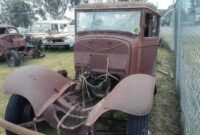Cheap Pickup Trucks For Sale: Your Ultimate Guide to Affordable Utility pickup.truckstrend.com
In a world where new vehicle prices continue to skyrocket, the allure of a reliable and affordable pickup truck has never been stronger. For many, a pickup truck isn’t just a luxury; it’s a vital tool for work, recreation, or daily utility. But what if your budget doesn’t stretch to a brand-new, fully-loaded model? This is where the world of "cheap pickup trucks for sale" becomes your oyster. Far from being merely undesirable or worn-out vehicles, these often represent incredible value, offering robust capability and versatility without the hefty price tag.
This comprehensive guide will navigate the landscape of affordable pickups, helping you understand what makes a cheap truck a smart investment, where to find them, what to look for, and how to make a confident purchase that serves your needs for years to come. Whether you’re a small business owner, a DIY enthusiast, an off-road adventurer, or simply someone who needs to haul more than a sedan can manage, a cheap pickup truck might just be the perfect solution.
Cheap Pickup Trucks For Sale: Your Ultimate Guide to Affordable Utility
Why Consider a Cheap Pickup Truck? Unlocking Value and Utility
Opting for a used, budget-friendly pickup truck offers a surprising array of benefits that extend far beyond initial cost savings. Understanding these advantages can solidify your decision to explore this segment of the market.
- Exceptional Cost-Effectiveness: The most obvious benefit is the significantly lower purchase price compared to new or late-model trucks. This not only saves you money upfront but often translates to lower insurance premiums, reduced registration fees, and less financial stress if minor repairs are needed. Many older trucks also have simpler mechanics, making DIY maintenance more feasible and professional repairs potentially less expensive.
- Utility and Versatility: A pickup truck, regardless of its age or price, is inherently a workhorse. It offers unmatched utility for hauling construction materials, moving furniture, towing trailers, transporting outdoor gear, or simply handling larger grocery runs. For many, it serves as a versatile daily driver that can transition seamlessly from commuting to tackling weekend projects.
- Proven Reliability: Many older pickup truck models, especially those from the late 1990s and early 2000s, were built with a focus on durability and simplicity. Less reliance on complex electronics and more on robust mechanical components often means these vehicles can rack up hundreds of thousands of miles with proper maintenance. Their longevity is a testament to their engineering.
- Depreciation Advantage: New vehicles suffer the steepest depreciation in their first few years. By buying a "cheap" truck, you’re acquiring a vehicle that has already taken its significant depreciation hit. This means its value will likely stabilize, and you won’t lose a substantial amount of money if you decide to sell it a few years down the line.
- Customization Potential: Older trucks often serve as excellent platforms for customization, whether for off-roading, work utility, or aesthetic upgrades. With a lower initial investment, you have more budget available to personalize your truck to perfectly suit your specific needs and style.

Where to Find Cheap Pickup Trucks: Your Search Strategy
Finding the right cheap pickup truck requires a multi-faceted approach. Knowing where to look can significantly increase your chances of snagging a great deal.

- Private Sellers (Online Marketplaces & Local Ads): Websites like Craigslist, Facebook Marketplace, and local classifieds (both online and print) are goldmines for private party sales. You often get direct communication with the owner, allowing you to ask detailed questions about the vehicle’s history and negotiate prices more flexibly. Be prepared to do your own due diligence.
- Used Car Dealerships (Specialized & General): While dealerships typically have higher overheads and thus slightly higher prices, they offer conveniences like financing options, limited warranties (sometimes), and a more structured buying process. Look for smaller, independent used car lots that specialize in trucks or utility vehicles, as they might have a better selection of older models.
- Online Automotive Marketplaces: Major platforms like Autotrader, Cars.com, and eBay Motors allow you to filter by price, mileage, and year, providing a vast inventory from both private sellers and dealerships across a wide geographic area. These are excellent for initial research and comparing multiple options.
- Public and Government Auctions: Auctions can offer incredibly low prices, especially for fleet vehicles, repossessions, or government surplus. However, buying at auction is often "as-is, where-is," meaning you usually can’t test drive and might have limited inspection time. This option is best for experienced buyers or those with mechanical knowledge.
- Fleet Sales & Repossessions: Businesses often cycle out their work trucks, and financial institutions deal with repossessed vehicles. These can be found through specialized auction houses or direct sales. While often well-maintained during their service life, they might have high mileage.
- Word of Mouth: Sometimes, the best deals come from friends, family, or colleagues who are looking to sell a vehicle they’ve owned and maintained. Let people know you’re in the market!

What to Look For: Key Considerations When Buying Cheap
Purchasing a cheap pickup truck means you need to be an astute buyer. A thorough inspection and careful consideration of several factors will help you avoid costly mistakes.
- Define Your Budget (Beyond Purchase Price): Remember that the purchase price is just one part of the equation. Factor in potential immediate repairs, registration, insurance, and ongoing maintenance. Have a contingency fund ready, ideally 10-20% of the purchase price, for unexpected issues.
- Intended Use: How will you primarily use the truck?
- Daily Driver: Focus on comfort, fuel efficiency (relative to trucks), and reliability.
- Hauling/Towing: Prioritize engine health, transmission, suspension, and brake condition. Check tow ratings.
- Off-Roading: Inspect 4×4 system, suspension, frame integrity, and tire condition.
- Work Truck: Look for durable interiors, a strong bed, and appropriate power.
- Comprehensive Condition Assessment: This is critical.
- Exterior: Rust is the enemy. Check the frame rails, rocker panels, wheel wells, and bed. Look for large dents, poor paint jobs (indicating hidden damage), and uneven panel gaps.
- Interior: Check for excessive wear, tears in upholstery, malfunctioning electronics (windows, locks, radio, AC/heat), and water damage (musty smell, stained carpets).
- Engine & Transmission: Listen for strange noises (knocking, ticking, whining). Look for fluid leaks (oil, coolant, transmission fluid). Check fluid levels and color. During a test drive, ensure smooth shifting, no hesitation, and consistent power delivery. Watch for warning lights (Check Engine, ABS, etc.).
- Suspension & Brakes: Bounce each corner of the truck to check shocks. Listen for clunks or squeaks over bumps. Test the brakes for pulling, sponginess, or grinding noises.
- Tires: Check tread depth and look for uneven wear, which can indicate alignment or suspension issues.
- Maintenance History: Ask for service records. A truck with a thick stack of maintenance receipts is often a better bet than one with none, even if it has higher mileage.
- VIN Check: Run a Vehicle History Report (e.g., CarFax, AutoCheck) using the VIN. This can reveal accident history, salvage titles, odometer fraud, previous owners, and reported maintenance.
- Title Status: Ensure the title is "clean." Avoid "salvage," "rebuilt," or "flood" titles unless you are an expert mechanic and understand the risks involved.
- Mileage: While lower mileage is generally preferred, a well-maintained high-mileage truck is often a better purchase than a low-mileage truck that has been neglected. Focus on condition and maintenance history over just the odometer reading.
- Common Issues by Make/Model: Do your research! Every vehicle has its quirks and common failure points. Knowing these beforehand can help you inspect more effectively and ask targeted questions.
Popular Cheap Pickup Truck Models: Reliable Workhorses
Certain models consistently rise to the top when discussing reliable and affordable used pickups. Their widespread popularity means parts are readily available and mechanics are familiar with them.
- Compact/Mid-size:
- Toyota Tacoma (Older Generations – 1st & 2nd Gen): Legendary for reliability, durability, and strong resale value. Can be harder to find "cheap" but offers immense value.
- Nissan Frontier (1st & 2nd Gen): A strong contender, known for its robust engines and capable chassis. Offers good value.
- Ford Ranger (3rd Gen, pre-2011): Simple, durable, and incredibly popular. Parts are abundant, and they are often very affordable. Excellent for basic utility.
- Chevrolet Colorado/GMC Canyon (1st Gen): Decent reliability, comfortable, and good for light to medium duty.
- Chevrolet S-10/GMC Sonoma: Older, but very cheap and simple. Great for a bare-bones work truck.
- Full-size:
- Ford F-150 (10th, 11th, 12th Gen): The best-selling vehicle for decades. You can find older generations at excellent prices. Parts are everywhere, and they’re known for their V8 power.
- Chevrolet Silverado/GMC Sierra (GMT800/GMT900 Platforms): Highly reliable V8 engines, comfortable rides, and readily available parts. A solid choice for heavy duty.
- Dodge Ram 1500 (2nd & 3rd Gen): Known for their powerful V8s and distinctive styling. Can be found cheaply, but watch for common issues like rust and transmission problems in some models.
Negotiation and Post-Purchase Tips: Securing Your Investment
Once you’ve found a promising candidate, these tips will help you seal the deal and ensure your new-to-you truck starts its life with you on the right foot.
- Negotiation Tactics:
- Research Market Value: Know what similar trucks are selling for in your area.
- Point Out Flaws: Use any defects (minor dents, worn tires, non-critical repairs needed) as negotiation points.
- Be Prepared to Walk Away: This is your strongest leverage. Don’t feel pressured to buy.
- Start Lower: Offer slightly below what you’re willing to pay, leaving room to negotiate upwards.
- Pre-Purchase Inspection (PPI): This is non-negotiable for a cheap truck. Take the truck to an independent, trusted mechanic for a thorough inspection before you buy. They can uncover hidden issues that you might miss and provide an estimate for any necessary repairs, which can then be used for further negotiation.
- Post-Purchase Checklist:
- Fluid Changes: Even if the seller says they were just done, change the oil, oil filter, air filter, and check/change transmission fluid, brake fluid, power steering fluid, and coolant.
- Basic Tune-Up: Spark plugs, wires, distributor cap/rotor (if applicable).
- Tires and Brakes: Ensure they are safe and in good condition.
- Address Known Issues: Prioritize safety-related repairs immediately.
- Clean and Detail: A thorough cleaning can make the truck feel like new and help you discover any overlooked issues.
Potential Challenges and Solutions
Buying cheap isn’t without its potential pitfalls, but most can be mitigated with preparation and smart decisions.
- Challenge: Hidden Problems: The biggest fear is buying a "lemon."
- Solution: A comprehensive Pre-Purchase Inspection (PPI) by a qualified mechanic is your best defense. Also, a thorough test drive and VIN check are crucial.
- Challenge: Rust: Especially in colder climates, rust can be a structural issue, not just cosmetic.
- Solution: Inspect the frame meticulously. Minor surface rust can be treated, but extensive structural rust (holes, flaking) is a deal-breaker.
- Challenge: Parts Availability: For very old or obscure models, finding parts can be difficult.
- Solution: Stick to popular models (Ford F-Series, Chevy Silverado, Toyota Tacoma/Tundra, Ford Ranger) where parts are abundant and often cheaper.
- Challenge: High Mileage: Some buyers are wary of high-mileage vehicles.
- Solution: Focus on maintenance history and overall condition rather than just the odometer. A well-maintained 200,000-mile truck is better than a neglected 100,000-mile one.
- Challenge: Resale Value: Will you be stuck with it?
- Solution: Popular, well-maintained models, especially Toyotas and Fords, tend to hold their value remarkably well, even as older trucks. If you keep it in good shape, you might even recoup your investment.
Estimated Price Guide for Cheap Pickup Trucks
It’s crucial to understand that "cheap" is relative, and prices fluctuate wildly based on location, exact year, trim level, mileage, condition, and market demand. The table below offers estimated ranges for popular models in good, runnable condition (typically 10-25 years old, 150,000-250,000+ miles), assuming a private sale. These are for guidance only; always research local market prices.
| Make/Model | Estimated Price Range (USD) | Key Considerations / Notes |
|---|---|---|
| Ford F-150 (10th-12th Gen) | $3,000 – $10,000 | America’s best-seller. Abundant parts, strong V8 options. Watch for rust on older models, spark plug issues on some 5.4L Triton engines, and common issues related to age/mileage. |
| Chevrolet Silverado 1500 / GMC Sierra 1500 (GMT800/GMT900) | $3,500 – $11,000 | Robust V8 engines, durable transmissions. Known for reliability. Check for rust around wheel wells, brake lines, and frame. Some models may have instrument cluster issues or active fuel management (AFM) concerns. |
| Dodge Ram 1500 (2nd-3rd Gen) | $2,500 – $9,000 | Powerful Hemi V8s. Can be found cheaper than Ford/Chevy. Watch for rust (especially around fenders and tailgate), transmission issues (especially 46RE/47RE), and dashboard cracks. |
| Toyota Tacoma (1st-2nd Gen) | $5,000 – $15,000+ | Legendary reliability and resale value. Often commands higher prices even for older models. Check for frame rust (especially on 1st gen – some were recalled), ball joint issues, and minor engine leaks. Expect to pay more for 4×4. |
| Ford Ranger (3rd Gen, pre-2011) | $2,000 – $7,000 | Simple, reliable, and fuel-efficient (for a truck). Excellent workhorse. Parts are cheap and plentiful. Check for frame rust, transmission issues on automatics (less common), and general wear and tear from work use. |
| Nissan Frontier (1st-2nd Gen) | $3,000 – $9,000 | Solid mid-size option. Good V6 engines. Some 2nd gen models had SMOD (Strawberry Milkshake of Death) coolant/transmission fluid mixing issues if radiators weren’t replaced. Check for rust on frame and body. |
| Chevrolet Colorado / GMC Canyon (1st Gen) | $2,500 – $8,000 | More modern than S-10. Can be found with 4-cyl, 5-cyl (unique), or V8. Watch for minor electrical issues, rust on rear fenders, and AC problems. Generally reliable for light-duty. |
| Toyota Tundra (1st Gen) | $4,000 – $12,000 | Often considered a "mini-Tundra" due to its smaller size compared to modern full-size trucks. Extremely reliable V8. Check for frame rust (similar to Tacoma issues), lower ball joint recalls, and general wear. A fantastic value if well-maintained. |
Disclaimer: These prices are highly generalized. Always conduct your own local market research using sites like Kelley Blue Book (KBB.com), Edmunds.com, and local classifieds to get the most accurate current valuations. Condition is king – a pristine example will always command a premium, while a rough one will be much cheaper.
Conclusion: The Smart Path to Pickup Ownership
Buying a cheap pickup truck for sale isn’t about settling for less; it’s about smart, value-driven purchasing. These vehicles offer an unparalleled blend of utility, affordability, and often, surprising longevity. By understanding the benefits, knowing where to search, meticulously inspecting potential candidates, and employing smart negotiation tactics, you can secure a workhorse that serves your needs for years without breaking the bank. Patience, thorough research, and a crucial pre-purchase inspection are your best allies in transforming a "cheap" truck into a truly invaluable asset. Embrace the journey, and you might just find your perfect, budget-friendly companion for life’s biggest hauls.
Frequently Asked Questions (FAQ) about Cheap Pickup Trucks For Sale
Q1: What is considered "high mileage" for a cheap pickup truck?
A1: For older, cheap pickup trucks, anything over 150,000 miles is generally considered high mileage. However, modern trucks (especially full-size V8s) are often built to last 250,000 to 300,000 miles or more with proper maintenance. Focus more on the truck’s maintenance history and overall condition rather than just the odometer reading alone.
Q2: Is it better to buy a cheap truck from a private seller or a dealership?
A2: Private sellers often offer lower prices because they don’t have the overhead of a dealership, and there’s more room for negotiation. However, dealerships might offer some peace of mind with basic inspections, sometimes limited warranties, and financing options. Private sales require more diligence on your part (e.g., arranging a PPI yourself).
Q3: What’s the most reliable cheap pickup truck I can buy?
A3: Toyota Tacoma (especially 1st and 2nd gen) and Toyota Tundra (1st gen) consistently rank high for reliability, though they tend to be more expensive even used. The Ford F-150 and Chevrolet Silverado/GMC Sierra (older V8 models) are also highly reliable options, with abundant parts and mechanical simplicity.
Q4: How much should I budget for immediate repairs after buying a cheap truck?
A4: It’s wise to budget at least 10-20% of the truck’s purchase price for immediate maintenance (fluid changes, tune-up) and potential unexpected repairs identified during a pre-purchase inspection. For a truck costing $5,000, setting aside $500-$1,000 would be a prudent starting point.
Q5: Should I consider a truck with a salvage or rebuilt title?
A5: Generally, it’s advisable for most buyers to avoid salvage or rebuilt title trucks, especially if you lack extensive mechanical knowledge. These vehicles have been declared a total loss by an insurance company due to significant damage (accident, flood, fire, theft). While cheaper, they can have hidden structural or electrical issues, be difficult to insure, and have significantly lower resale value. Only consider if you’re an expert and fully understand the risks.
Q6: How important is a pre-purchase inspection (PPI)?
A6: A PPI is crucial when buying a cheap used truck. It’s the best money you’ll spend. An independent mechanic can identify existing problems, potential future issues, and provide an estimate for repairs, giving you leverage for negotiation or helping you avoid a costly mistake.
Q7: Can I get financing for a cheap, older pickup truck?
A7: Financing options for very old or very cheap vehicles can be limited. Many traditional banks prefer not to finance vehicles over a certain age or with very high mileage. You might need to secure a personal loan, use a credit union, or pay cash.



